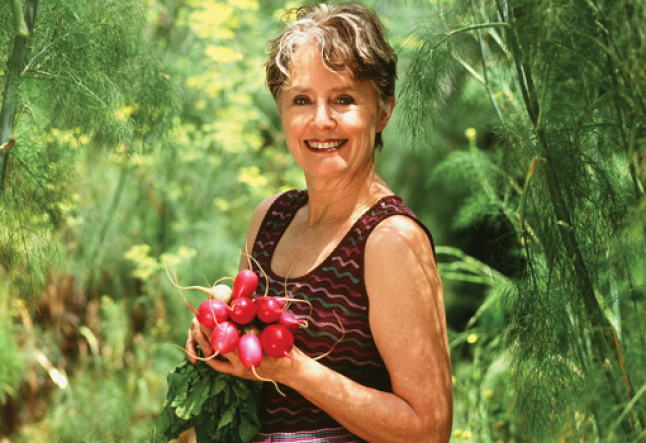tomorrow’s organic school lunch

While yogis and yoginis may be munching organic veggies at noontime, very few school-age kids are joining us. School lunches fall far short of five stars””whether for flavor, nutrition or kid-appeal.
Enter Alice Waters. Look out potato chips!
Waters is well known as the founder of Chez Panisse restaurant in Berkeley, author/co-author of eight books and a visionary leader in using fresh, local ingredients from local farms. She has received more awards and accolades than your average Cal student of French Cultural Studies might imagine. But perhaps her greatest contribution is unfolding right now with children.
For more than a decade, Waters has been working to bring children into a healthy, balanced, delicious relationship with food through a radical new approach to public school lunches. Working with partners such as the Center for Ecoliteracy and Children’s Hospital, Waters has launched a comprehensive program that engages kids in the whole process of growing, preparing, serving and sharing healthy meals. In the Rethinking School Lunch program, kids learn about all aspects of food and nutrition, with academic rigor as well as direct experiences. The result? “The kids have pride in the food,” says Waters. “They really care. They are so hungry not just for healthy food, but for meaningful experiences.”
Kids may be hungry, but they’re certainly eating something! Child obesity has quadrupled in the last 20 years. The associated medical costs are rising at least that fast, which puts pressure on health organizations to find effective solutions. While a nutritionist might hand out the newly updated Food Pyramid and a parent might put yet another plate of steamed vegetables in front of their children, Waters seeks to reach kids through pleasure and open them up to the vast subject of food. She aims to “get them to fall in love” with healthy food.
But the program is not just about delicious flavors. “School lunch must become an academic subject,” says Waters. The Rethinking School Lunch (RSL) program uses a ”˜systems approach’ to address the crisis in childhood obesity, provide nutrition education and teach ecological knowledge. It creates a framework for a comprehensive curriculum that integrates campus gardens, kitchen classrooms, school lunch and a wide range of academic subjects. It recognizes the interconnectedness of schools’ food purchasing decisions, the viability of family farms, solid waste generated by school lunchrooms, and the environmental cost of shipping food over thousands of miles.
The program is ambitious and not inexpensive. Waters is raising significant sums of money to roll out the program in the Berkeley public school system, starting with middle school. But given the massive costs of obesity-related illness, environmental degradation and cultural breakdown, the up-front cost of a nationwide holistic food curriculum like Rethinking School Lunch, looks cost-effective and downright inexpensive. America spends an estimated $117 billion a year on obesity-related costs, but only $1.7 billion on the national school lunch program.
Waters compares the current situation to the 1960s physical fitness crisis, when communities and policymakers at the federal, state and local levels united to address the problem. They created a mandatory physical education program for all public schools and invested in gymnasiums, equipment, tracks, fields, program development and staff. “Where there’s a will, there’s a way,” reminds Waters.
What can parents do to help? Since 85% of kids don’t eat meals with their families, Waters says eating together is a good start. “Find time to be with the kids at the table whenever you can””breakfast, snacks, dinner. Engage kids in cooking the food. Take them out to the farm, if you can, to pick apples or strawberries or whatever is available. Go to the farmers’ market and let kids see the seasonality and diversity of food; let them meet the people.”
No kids in sight? We can all reconsider our relationship with food. Waters suggests shopping at farmers markets (where all payments go directly to the farmer), preparing meals at home with friends and learning how to cook (…again). If a farmers’ market isn’t available, talk with the produce manager of your local supermarket; ask what’s local, what’s organic and what day does this item come in? When enough customers ask for something, stores respond.
If the school lunch program intrigues you, Waters suggests contacting your local public schools. Start asking questions. Find out if anyone is working on this issue in your local schools (as is happening in Ojai, Los Angeles and elsewhere). Visit the school cafeteria and see for yourself what the kids in your community are eating.
To find out more about Rethinking School Lunch, go to ecoliteracy.org. To contribute directly to the program through the Chez Panisse Foundation, go to chezpanisse.com
Read next >> healthy food, not so healthy?